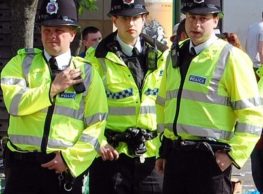By James Simons-
The government has announced new plans to empower more officers to authorise enhanced stop and search powers as part of continued action to tackle knife crime.
Home Secretary Sajid Javid is announced the plans to facilitate the British police to use section 60 of the Criminal Justice and Public Order Act. This empowers officers to stop and search anyone in a designated area without needing reasonable grounds for suspicion, if serious violence is anticipated. The latter ambit of the new powers could create unnecessary debate if those stop question the police judgement for suspecting serious violence.
The recent spate of knife attacks justify the new powers for police to stop young males in certain areas where they suspect knife carrying to rife, irrespective of whether serious violence is suspected. Searches should be thorough and include close taps of men’s trousers, with cops demonstrating awareness that many youths will seek to hide pocket knives in their pants to escape detection. Searches should necessarily include examinations of individuals shoes where they could also hide a knife.
Charges of racism by minority groups must be ignored when these powers are being exercised, and those who choose to stress the point should be cautioned for obstructing justice in those scenarios. The epidemic of knife killings calls for tough measures like this, to both act as a deterrent and to also catch more individuals carrying knives.
The changes apply to seven police forces who collectively account for over 60% of total national knife crime and will result in at least 3,000 more officers being able to authorise section 60. The new measures are expected to run for up to a year, including a review after 6 months.
The Home Secretary has lifted 2 conditions in the voluntary Best Use of Stop and Search Scheme by:
reducing the level of authorisation required for a Section 60 from senior officer to inspector
lowering the degree of certainty required by the authorising officer so they must reasonably believe an incident involving serious violence ‘may’, rather than ‘will’, occur
Prime Minister Theresa May said:
These changes will support police officers tackling serious violence in the worst affected areas.
Stop and search powers are an important tool in the fight against knife crime, and we will continue to drive tough law enforcement to protect the public.
As a whole society we also need to take a hard look at the root causes of these crimes so we can intervene earlier and stop young people from being drawn into violence in the first place.
Home Secretary Sajid Javid said:
The police are on the front line in the battle against serious violence and it’s vital we give them the right tools to do their jobs.
Stop and search is a hugely effective power when it comes to disrupting crime, taking weapons off our streets and keeping us safe.
That’s why we are making it simpler for police in areas particularly affected by serious violence to use Section 60 and increasing the number of officers who can authorise the power.
The change follows a Home Secretary round table with police leaders on knife crime earlier this month, where the need for this power was discussed.
It also comes ahead of the Prime Minister’s summit on serious youth violence in Downing Street tomorrow. This will bring together Ministers, community leaders, agencies and other experts to explore what more we can do as a whole society to tackle the root causes of serious violence and intervene earlier, alongside tough law enforcement.
ADDITIONAL FUNDING
Earlier this month, the government announced £100 million additional funding to support areas most affected by serious violence, boosting policing capacity and enabling the creation of multi-agency violence reduction units.
The changes to section 60 will initially apply in areas particularly affected by violent crime – London, West Midlands, Merseyside, South Yorkshire, West Yorkshire, South Wales and Greater Manchester – for up to a year. Forces are also expected to engage with communities on its use, and nobody should be stopped on the basis of their race or ethnicity.
Section 60 is often used after an incident of serious violence when police anticipate reprisal attacks. The power was used to protect festival-goers at last year’s Notting Hill Carnival, where four knives and a corrosive substance were seized. It was also deployed by the Metropolitan Police and British Transport Police during a recent operation outside Stratford Station, east London, where officers seized six weapons and made 27 arrests.
Commissioner of the Metropolitan Police Cressida Dick said:
I welcome the Home Secretary’s continuing support for our officers using stop and search to tackle violent crime. Stop and search is an extremely important power for the police. It is undoubtedly a part of our increasing results suppressing levels of violence and knife crime.
Our well-trained officers, acting on intelligence, use their powers professionally every day to remove weapons and other illegal items from the streets and to arrest violent offenders and those who habitually carry weapons.
In the last 18 months we have also increased the use of our powers under section 60 to prevent further violence from taking place. We are combining this with communication and engagement, so the public feel informed and supportive of our enforcement activities to tackle violent crime.
Alongside support for the police, the government continues to focus on early intervention and last week appointed charitable foundation Impetus to manage its £200 million youth endowment fund, designed to tackle youth violence.




